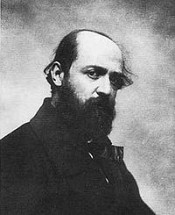Murger Henry

Louis-Henri Murger, also known as Henri Murger and Henry Murger (27 March 1822, Paris - 28 January 1861, Paris) was a French novelist and poet. He is chiefly distinguished as the author of Scènes de la vie de bohème, from his own experiences as a desperately poor writer living in a Parisian attic, and member of a loose club of friends who called themselves "the water drinkers" (because they were too poor to afford wine). In his writing he combines instinct with pathos and humour, sadness his predominant tone. The book is the basis for the operas La Bohème (Puccini) and La bohème (Leoncavallo), and, at greater removes, the zarzuela Bohemios (Amadeu Vives), the operetta Das Veilchen vom Montmartre (Kálmán) and the Broadway musical Rent. He wrote lyrics as well as novels and stories, the chief being La Chanson de Musette, "a tear," says Gautier, "which has become a pearl of poetry".[1] Murger was the son of a German immigrant to Paris who worked as a tailor and janitor for an apartment building in the Rue Saint Georges. He had a scanty and fragmented education. After leaving school at 15 he worked in a variety of menial jobs before securing one in a lawyer's office. While there he also wrote poetry which came to the attention of the French writer Étienne de Jouy. De Jouy's connections enabled him to secure the position of secretary to Count Tolstoi, a Russian nobleman living in Paris. Murger's literary career began about 1841. His first essays were mainly literary and poetic, but under the pressure of earning a living he wrote whatever he could find a market for, turning out prose as he put it, "at the rate of eighty francs an acre".[2] At one point he edited a fashion newspaper, Le Moniteur de la Mode, and a paper for the millinery trade, Le Castor. His position gradually improved when the French writer Champfleury, with whom he lived for a time, urged Murger to devote himself to fiction. His first big success was Scènes de la vie de bohème. In 1851 Murger published a sequel, Scènes de la vie de jeunesse. Several more works followed, but none of them brought him the same popular acclaim. He lived much of the next ten years in a country house outside Paris, dogged by financial problems and recurrent ill health. In 1859 he received the Légion d'honneur but within two years he was almost penniless and dying in a Paris hospital. Napoleon III's minister Count Walewsky sent 500 francs to help pay his medical expenses, but it was too late. Henri Murger died on 28 January 1861 at the age of 39. The French government paid for his funeral, which from contemporary accounts in Le Figaro was a great public occasion attended by 250 luminaries from journalism, literature, theatre, and the arts. Le Figaro also started a fund to raise money for his monument. Hundreds of people contributed and within two months it had raised over 6500 francs.[3] Early in his career, in an effort to make himself appear more "elegant and noticeable", Murger signed his name as "Henry Mürger", the English-looking y and German-looking umlaut both being exotic in French.[4] After experimenting with other variations he eventually kept the former but dropped the latter, so that all of his best-known works were published under the name "Henry Murger". Henri Murger's literary works include:
do you like this author?
What readers are saying
What do you think? Write your own comment on this book!
write a commentWhat readers are saying
What do you think? Write your own comment on this author!
write a commentBook list

Bohemians of the Latin Quarter
Series:
Unknown
Year:
Unknown
Raiting:
3/5
This book was converted from its physical edition to the digital format by a community of volunteers. You may find it for free on the web. Purchase of the Kindle edition includes wireless delivery.
Show more
add to favoritesadd In favorites
Book list

Bohemians of the Latin Quarter
Series:
Unknown
Year:
Unknown
Raiting:
3/5
This book was converted from its physical edition to the digital format by a community of volunteers. You may find it for free on the web. Purchase of the Kindle edition includes wireless delivery.
Show more
add to favoritesadd In favorites
What readers are saying
What do you think? Write your own comment on this author!
write a commentGenre
if you like Murger Henry try:
readers also enjoyed
What readers are saying
What do you think? Write your own comment on this author!
write a commentGenre
if you like Murger Henry try:
readers also enjoyed
Do you want to exchange books? It’s EASY!
Get registered and find other users who want to give their favourite books to good hands!

